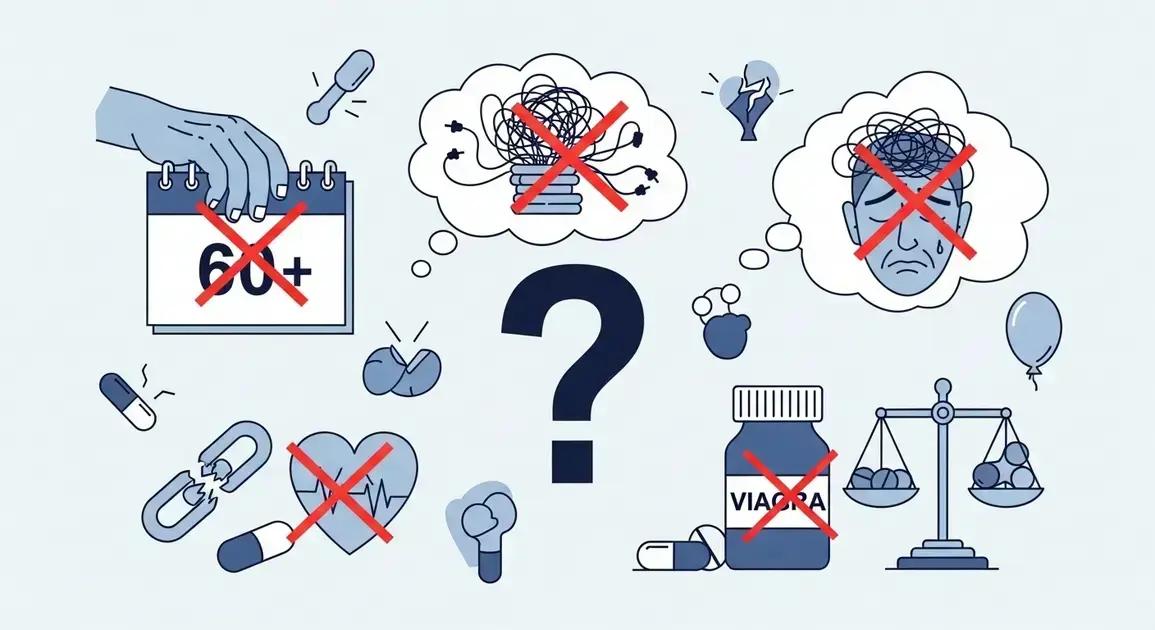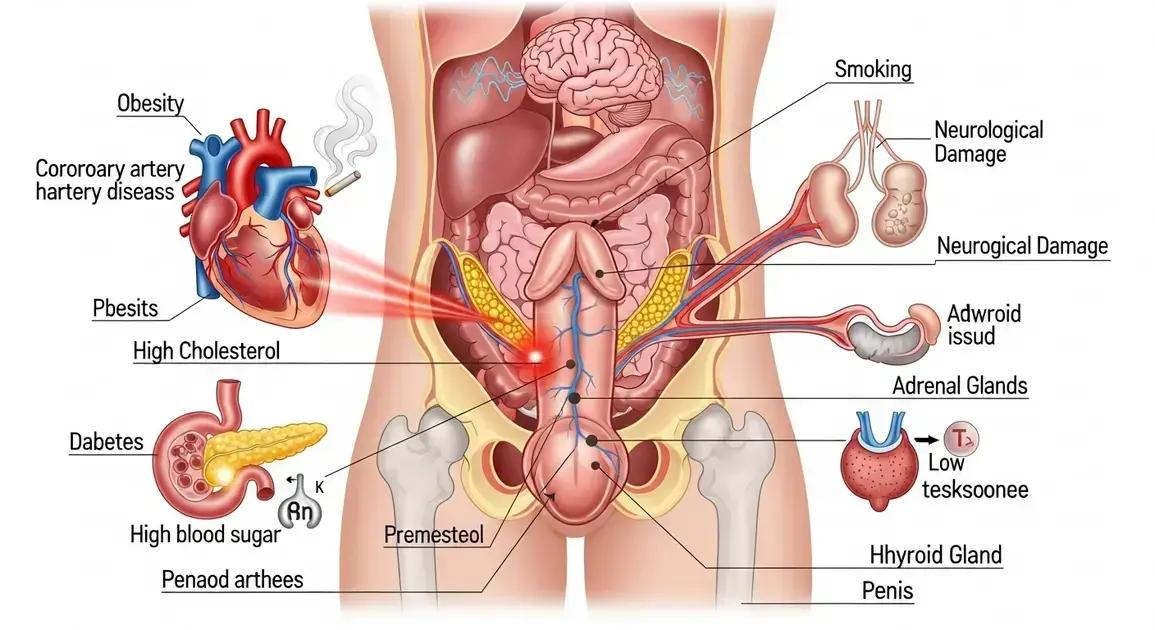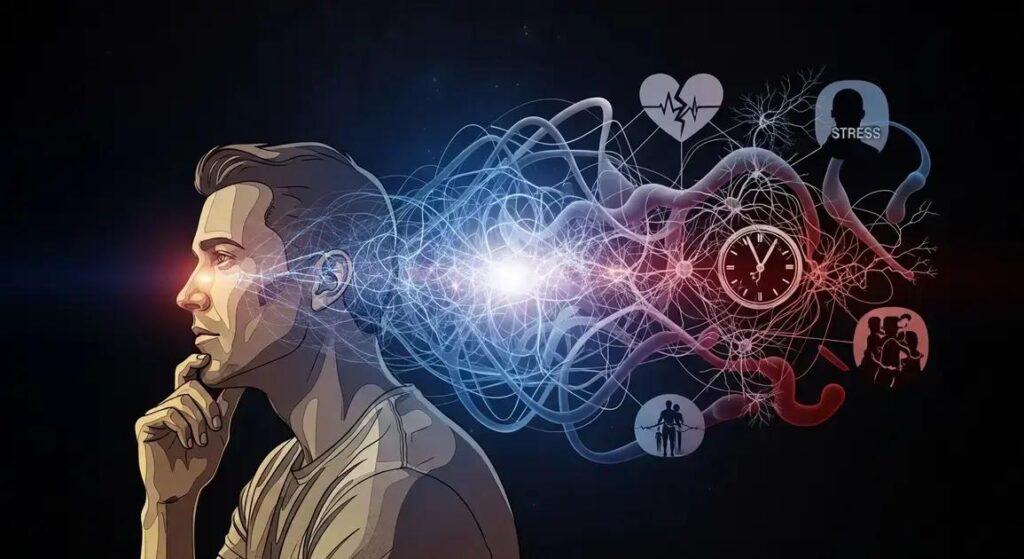The 7 hidden causes of erectile dysfunction most men ignore include physical health issues like diabetes and heart disease, psychological factors such as stress and anxiety, misconceptions about aging, hormonal imbalances, and lifestyle choices like poor diet and lack of exercise. Understanding these factors can help men address ED effectively through lifestyle changes, professional help, and supportive relationships.
Erectile dysfunction is a problem that many men face, yet few understand the hidden causes behind it. The truth is, it can stem from various factors beyond age or stress. In this article, we will uncover the 7 hidden causes of erectile dysfunction most men ignore, exploring both physical and psychological aspects that could be impacting your sexual health. By being aware of these lesser-known triggers, you can take the first steps towards improving your wellbeing.
Understanding Erectile Dysfunction
Erectile dysfunction (ED) is a condition where a man struggles to achieve or maintain an erection suitable for sexual intercourse. It can happen occasionally to anyone, but when it becomes a frequent issue, it can affect relationships and self-esteem. Understanding erectile dysfunction is crucial, as it can be linked to various factors, including psychological and physical health.
What Causes Erectile Dysfunction?
Many men think ED is just part of aging, but this isn’t the whole story. Understanding erectile dysfunction involves recognizing its various underlying causes.
Physical Factors
Physical health plays a big role in sexual function. Conditions like diabetes, heart disease, and high cholesterol can impact blood flow and nerve function, leading to ED. Additionally, certain medications may inhibit sexual performance, highlighting the importance of discussing medication effects with a doctor.
Psychological Factors
Psychological aspects, such as stress, anxiety, and depression, significantly influence erectile function. These emotional factors can create a cycle of performance anxiety, further complicating the issue.
Coping with Erectile Dysfunction
It is essential for men facing ED to communicate openly with their partners and seek professional help if necessary. Understanding the causes can help in developing effective treatment strategies.
Seeking Help
Seeing a healthcare professional is wise. They can provide insights, run necessary tests, and recommend treatments tailored to individual needs. No one should have to face this issue alone, and support is available.
Common Misconceptions

There are several common misconceptions about erectile dysfunction (ED) that can lead to confusion and stigma. Many men believe that ED only affects older men, but this is not true. Younger men can also experience ED due to various factors like stress, anxiety, or health issues.
Myth 1: ED is a Natural Part of Aging
While it is true that ED becomes more common as men age, it is not inevitable. Many older men maintain healthy sexual function, so it’s important to understand that ED is not just a result of aging.
Myth 2: It’s Always Psychological
Another misconception is that ED is always caused by psychological issues. While mental health can play a role, many physical conditions can cause or contribute to erectile dysfunction. These include diabetes, heart disease, and hormonal imbalances.
Myth 3: Only Weak or Lazy Men Have ED
This myth can be harmful. Men may be embarrassed to seek help due to fear of judgment. Erectile dysfunction is a medical issue that does not reflect a man’s character or masculinity.
Myth 4: Medications Are the Only Solution
Some believe that medications like Viagra are the only way to treat ED. While these medications can be effective, they are not the only option. Lifestyle changes, counseling, and other therapies can also help improve erectile function.
Myth 5: It Means You Don’t Find Your Partner Attractive
Many men worry that ED implies a lack of attraction to their partner. In reality, there are numerous reasons for erectile dysfunction that have nothing to do with physical attraction or love. Communication with partners can ease these concerns.
Psychological Factors
Many men do not realize that psychological factors can significantly contribute to erectile dysfunction (ED). Mental health plays a huge role in sexual performance. When men face stress or anxiety, it can hinder their ability to achieve or maintain an erection.
Stress
Stress from work, relationships, or financial issues can weigh heavily on a man’s mind. This stress can distract them during intimate moments, leading to difficulty with erections. Finding ways to manage stress is essential for sexual health.
Anxiety
Performance anxiety is a specific type of stress that occurs during sexual activity. Men may worry about pleasing their partner or fear failure. This anxiety can create a cycle where the worry of not performing well leads to actual erectile dysfunction.
Depression
Depression is another psychological factor that can result in ED. It can reduce libido and lead to feelings of hopelessness. Seeking treatment for depression can often improve not just mood, but also sexual function.
Relationship Issues
Problems within a relationship can also lead to psychological barriers. Communication is key; if partners are not discussing their feelings or concerns openly, it can create tension and contribute to ED.
Low Self-Esteem
Feelings of inadequacy or low self-esteem impact many men’s lives and can lead to erectile difficulties. Building self-confidence through therapy and supportive relationships can help alleviate these issues. Seeking help can lead to improved mental and sexual health.
Hidden Health Issues

Many men are unaware that hidden health issues can contribute to erectile dysfunction (ED). These underlying medical conditions may not be immediately visible but can significantly impact sexual health. Understanding these issues is crucial for addressing ED effectively.
Diabetes
Diabetes is one of the leading causes of erectile dysfunction. High blood sugar levels can damage blood vessels and nerves, affecting a man’s ability to achieve an erection. Regular check-ups and managing blood sugar levels can help mitigate this risk.
Cardiovascular Disease
Men with cardiovascular disease are also at a higher risk for ED. Conditions that affect blood flow, such as high cholesterol or hypertension, can impede the blood flow required for an erection. Maintaining heart health is key to preventing ED.
Hormonal Imbalances
Low testosterone levels can lead to erectile dysfunction. Hormonal imbalances may be caused by conditions like hypogonadism or age-related decline. Men experiencing reduced libido or energy should consult a healthcare provider to check hormone levels.
Neurological Disorders
Neurological problems, such as multiple sclerosis or Parkinson’s disease, can also affect erectile function. These conditions can disrupt nerve signals that are essential for achieving an erection. Early diagnosis and management of these disorders are important.
Obesity
Obesity can lead to other health conditions, including diabetes and heart disease, directly impacting erectile function. Maintaining a healthy weight through proper diet and exercise can reduce the risk of ED.
Lifestyle Changes to Consider
Making certain lifestyle changes can greatly impact sexual health and help reduce the risk of erectile dysfunction (ED). Here are some positive changes to consider that can lead to better overall health.
Regular Exercise
Engaging in regular physical activity is essential for maintaining a healthy weight and improving blood circulation. Exercise can help alleviate stress and boost mood, which are both beneficial for sexual function. Aim for at least 30 minutes of moderate exercise most days of the week.
Healthy Diet
A balanced diet rich in fruits, vegetables, whole grains, and lean proteins can support heart health and blood flow. Foods high in antioxidants and omega-3 fatty acids, like fish, can also be beneficial for erectile function.
Manage Stress
Finding effective ways to cope with stress can enhance mental health and potentially reduce ED. Practices like meditation, yoga, or deep breathing exercises can help in managing daily stressors.
Avoid Smoking and Excessive Alcohol
Smoking can damage blood vessels and reduce blood flow to the penis, leading to erectile dysfunction. Similarly, excessive alcohol consumption can also contribute to ED. Reducing or eliminating these habits can greatly improve sexual health.
Prioritize Sleep
Getting enough quality sleep is vital for overall health. Poor sleep is linked to reduced testosterone levels, which can lead to ED. Aim for 7-9 hours of uninterrupted sleep each night to promote hormonal balance and general wellbeing.
Understanding and Addressing Erectile Dysfunction
Recognizing the hidden causes of erectile dysfunction is crucial for any man experiencing this condition. From physical health issues like diabetes and cardiovascular disease to psychological factors and lifestyle choices, various elements can lead to ED.
By addressing these concerns, including making necessary lifestyle changes, men can significantly improve their overall sexual health. Seeking professional help when needed can provide valuable insights and treatment options.
Healthy sexual function is an important aspect of overall well-being, and understanding the factors that contribute to ED can empower men to take control of their health and enhance their quality of life.
FAQ – Frequently Asked Questions about Erectile Dysfunction
What are the common causes of erectile dysfunction?
Common causes include physical health issues like diabetes and heart disease, psychological factors such as stress and anxiety, and lifestyle choices including poor diet and inactivity.
Can younger men experience erectile dysfunction?
Yes, erectile dysfunction can affect younger men due to various factors like stress, anxiety, and underlying health issues.
How can lifestyle changes improve erectile dysfunction?
Regular exercise, a healthy diet, stress management, quitting smoking, and prioritizing sleep can all positively impact erectile function.
Is erectile dysfunction always linked to psychological issues?
No, while psychological factors can contribute to ED, many physical health problems can also be significant causes.
When should someone seek medical advice for erectile dysfunction?
If erectile dysfunction is frequent or causing distress, it’s important to consult a healthcare professional for evaluation and treatment options.
Can erectile dysfunction be treated?
Yes, there are various treatments available, including lifestyle changes, medications, counseling, and therapy, depending on the underlying cause.













